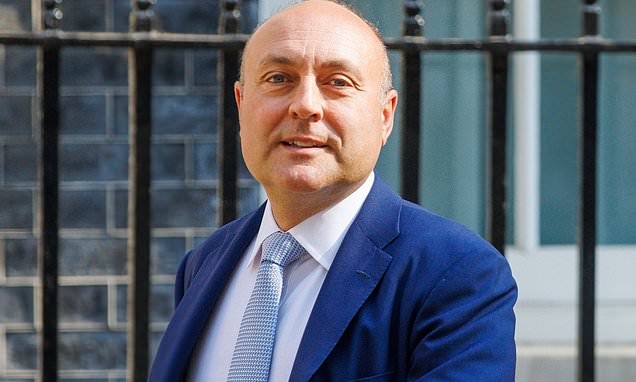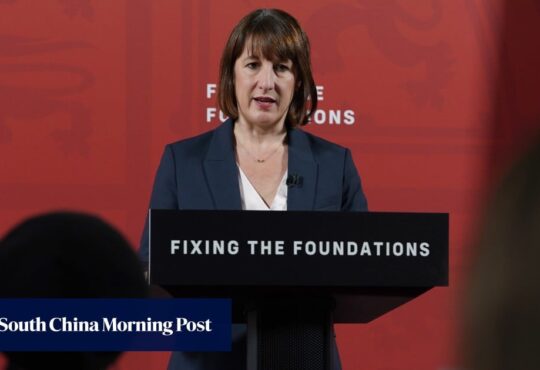Woke banks are ‘putting Britain at risk by refusing to invest in defence’ because they are worried about environmental and social issues

- Government growing concerned about refusal of the City to back British firms
- City Minister and Defence Minister said ‘defence needs an industrial base’
Britain’s security against countries such as Russia and North Korea is being threatened by woke financial institutions that refuse to invest in the defence industries, Ministers have warned.
The Government is growing increasingly concerned about the refusal of the City to back British firms, such as BAE Systems, due to so-called environmental, social and governance (ESG) issues.
ESG investing – also known as ‘socially responsible investing’, ‘impact investing’ and ‘sustainable investing’ – aims to optimise the effect of investing on the environment, society and corporate governance, and investments must include consideration of human wellbeing and the environment.
As a result, some investors are taking their money out of tobacco firms or oil giants, for example.
But investors – including the Church of England and Legal & General – are also avoiding the defence sector on ‘ethical’ grounds.
Nearly two thirds of institutional investors have divested from firms involved in security and defence, or are considering doing so.
Writing in today’s Mail on Sunday, City Minister Andrew Griffiths and Defence Minister James Cartlidge said that ‘peace needs defence, and defence needs an industrial base’.
They add: ‘It is perverse that as war rages on our continental doorstep there is a parallel universe where the defence sector is being shunned.
There is a troubling misunderstanding within investor preferences and the defence sector… that risks starving the industry of capital at competitive valuations.’
Their warning follows the row over the cancellation of Nigel Farage’s Coutts bank account, which led to the resignation of Dame Alison Rose, the chief executive of its parent bank NatWest, and Coutts chief executive Peter Flavel, after it emerged that Mr Farage had been ‘debanked’ because of his political views.
A senior Treasury source warned last night that the same ‘disease of wokery’ had infected investing, adding: ‘It is as wrong for investors to defund an industry that protects peace and democracy from threats such as Putin as it is for a bank to cancel its customers based on their lawful political views.
‘The core role of financial institutions is to help people save, access credit and to invest.
‘These are noble purposes, but it goes wrong when managers conflate the interests of customers with their own woke agendas. The uber-liberal values embraced by the woke-ists depend on our nuclear shield.’
Mr Griffiths and Mr Cartlidge add: ‘If Russian tanks roll further into Europe, the freedom we all take for granted would go out the window.’
How perverse to shun this sector at the very moment war is on our doorstep
By Andrew Griffith, City Minister, and James Cartlidge, Defence Minister
When Russia invaded Ukraine, the British people were unequivocal in their response to President Volodymyr Zelensky’s call for aid.
Alongside humanitarian support and the Homes for Ukraine host scheme, the UK has provided vital military aid, training 18,000 of its personnel and enabling it to reverse much of Russia’s advance.
It was widely recognised that giving Ukraine the means to defend itself – including British military hardware – was the right moral choice.
That choice was to support what most of us think is a vital ethical principle – the pursuit of peace. But peace needs defence, and defence needs an industrial base.
So it is perverse that as war rages on our continental doorstep there is a parallel universe where the defence sector is being shunned.
There is a troubling misunderstanding within investor preferences and the defence sector – which includes firms such as BAE Systems, Babcock and QinetiQ – that risks starving the industry of capital at competitive valuations.
In one survey, a staggering 60 per cent of institutional investors stated they had divested or considered divesting from firms involved with security and defence due to concerns about Environmental, Social and Governance (ESG) issues.
Yet it is blindly apparent that all businesses rely on the peace and stability delivered by the Armed Forces and the industrial base which supports them.
The UK defence sector has embraced ESG considerations in a range of ways – yet whether because of deliberate discrimination or the unintended consequences of a broad-brush approach, defence companies are swept up in ESG investment groupthink, with profound consequences for us all.
The biggest is that divesting from defence companies undermines Britain’s long-term security and democratic freedoms – not least the freedom to support environmental and social causes in the first place. There are not too many ESG outfits in Russia or North Korea.
A failure to invest in defence and security firms also damages the economy. Defence is a huge nationwide creator of employment, with 141,000 direct jobs and many more indirectly across the supply chain.
What’s more, there are wider applications of technologies first developed in the defence sector and vice versa. The internet, satellite navigation and jet engines were born as military applications before creating sectors and changing our civilian way of life. Military-grade cyber capability protects us all.
Failure to recognise this robs investors and society alike of the opportunity to capitalise on tremendous innovations.
Without healthy access to investment, our industrial capacity and technological edge is blunted, with fewer companies becoming more reliant on Government support. And without a domestic defence industry, Britain would become simply a customer, rather than a producer.
Keeping ahead of the curve requires a strong and well-funded defence and security industrial base. There could hardly be a bigger or more positive social responsibility than investing in peace.
Investing in defence companies is a good thing – for our values, for investors and for society. If Russian tanks roll further into Europe, the freedom we all take for granted would go out the window.
The quicker investors realise this and come on board the better.






